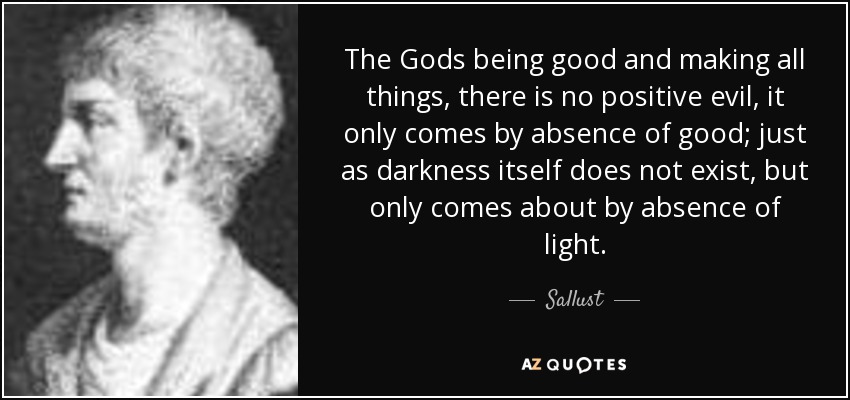The absence of good (Latin: privatio boni), also known as the privation theory of evil,[1] is a theological and philosophical doctrine that evil, unlike good, is insubstantial, so that thinking of it as an entity is misleading. Instead, evil is rather the absence, or lack (“privation”), of good.[2][3][4] This also means that everything that exists is good, insofar as it exists;[5][6] and is also sometimes stated as that evil ought to be regarded as nothing,[7] or as something non-existent.[8][9]
It is often associated with a version of the problem of evil: if some things in the world were to be admitted to be evil, this could be taken to reflect badly on the creator of the world, who would then be difficult to admit to be completely good.[1][6] The merit of the doctrine in serving as a response to this version of the problem of evil is disputed.[1]
History[edit]
The doctrine is sometimes said to be rooted in Plato.[10] While Plato never directly stated the doctrine, it was developed, based on his remarks on evil, by the Neoplatonist philosopher Plotinus,[11] chiefly in the eighth tractate of his First Ennead.[12]
Neoplatonism was influential on St. Augustine of Hippo,[13] with whom the doctrine is most associated. Augustine, in his Enchiridion, wrote:
Also, in his City of God, he wrote:
Through Augustine, this doctrine influenced much of Catholic thought on the subject of evil. For instance, Boethius famously proved, in Book III of his Consolation of Philosophy, that “evil is nothing”.[7] The theologian Pseudo-Dionysius the Areopagite also states that all being is good, in Chapter 4 of his work The Divine Names.[8] And Thomas Aquinas proved, in article 1 of question 5 of the First Part of his Summa Theologiae, that “goodness and being are really the same, and differ only in idea”.[5]
Later on, the philosopher Baruch Spinoza also agreed with the doctrine, when he said: “By reality and perfection I mean the same thing” (Ethics, part II, definition VI).[6][16]
Religious contexts[edit]
The doctrine is also held by the Baháʼí Faith. ʻAbdu'l-Bahá stated to a French Baháʼí woman:
Criticism[edit]
Bertrand Russell criticized the doctrine in his essay The Elements of Ethics:
References[edit]
- ^ a b c Calder, Todd (2020), "The Concept of Evil", in Zalta, Edward N. (ed.), The Stanford Encyclopedia of Philosophy (Summer 2020 ed.), Metaphysics Research Lab, Stanford University, retrieved 2020-09-11
- ^ Aquinas, Thomas (1990). Peter Kreeft (ed.). A Summa of the Summa. San Francisco: Ignatius Press. ISBN 0898703174.
- ^ Menssen, Sandra; Thomas D Sullivan (2007). The Agnostic Inquirer. Grand Rapids: William B. Eerdmans Pub. p. 136. ISBN 978-0802803948.
- ^ Teichman, Jenny; Katherine C Evans (1999). Philosophy : A Beginners Guide. Oxford: Blackwell Publishers. p. 45. ISBN 063121321X.
- ^ a b "SUMMA THEOLOGIAE: Goodness in general (Prima Pars, Q. 5)". www.newadvent.org. Retrieved 2020-09-11.
- ^ a b c d Russell, Bertrand. "The Elements of Ethics". fair-use.org. Retrieved 2020-09-11.
- ^ a b Boethius, -524. (1999). The consolation of philosophy. Watts, V. E. (Victor Ernest) (Rev. ed.). London: Penguin Books. ISBN 978-0-14-192037-5. OCLC 773581629.
- ^ a b Rorem, Paul. (1993). Pseudo-Dionysius : a commentary on the texts and an introduction to their influence. New York: Oxford University Press. p. 148. ISBN 1-4237-6478-1. OCLC 65213301.
- ^ "Nonbeing | Encyclopedia.com". www.encyclopedia.com. Retrieved 2020-09-11.
- ^ "188. The Privation Theory of Evil, Part 1 – PHILOSOPHICAL EGGS". Retrieved 2020-09-11.
- ^ O’Rourke, Fran (2015), Dougherty, M. V. (ed.), "Evil as privation: the Neoplatonic background to Aquinas's De malo, 1", Aquinas's Disputed Questions on Evil: A Critical Guide, Cambridge Critical Guides, Cambridge: Cambridge University Press, pp. 192–221, doi:10.1017/cbo9781107360167.010, ISBN 978-1-107-62146-6, retrieved 2020-09-11
- ^ Plotinus. (30 June 2005). The enneads. Dillon, John M., Mackenna, Stephen, 1872-1934. London. p. 109. ISBN 0-14-191335-5. OCLC 1004978078.
- ^ "Platonism - Augustinian Platonism". Encyclopedia Britannica. Retrieved 2020-09-11.
- ^ Augustine. "What Is Called Evil in the Universe Is But the Absence of Good". Enchridion. Retrieved 2012-11-17.
- ^ al, Philip Schaff et. Nicene and Post-Nicene Fathers: Series I/Volume II/City of God/Book XI.
- ^ Spinoza, Baruch. "Ethics, part 2". capone.mtsu.edu. Retrieved 2020-09-11.
- ^ ʻAbdu'l-Bahá. "The Nonexistence of Evil.". Some Answered Questions. Retrieved 2012-11-21.

No comments:
Post a Comment